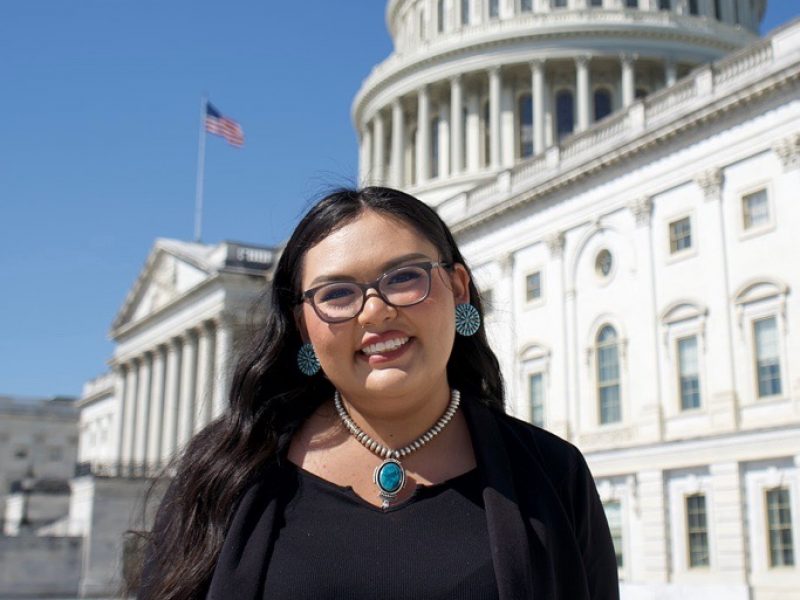Brooke Graymountain Davis named 2025 CHHS Outstanding Graduate Student

Throughout her time at Northern Arizona University, Brooke Graymountain Davis has been deeply committed to advancing health equity for Indigenous communities through a combination of learning, advocacy, and leadership. This journey has been fueled by a strong desire to contribute to positive and sustainable change, blending academic rigor with active service to improve the lives of Indigenous peoples, and as a result was named the 2025 CHHS Outstanding Graduate Student.
According to Brooke, one of the most formative experiences in her academic career was her involvement in drafting and editing the Yavapai-Apache Nation and Northeastern Arizona Indian Water Rights Settlement Acts of 2024. During her summer congressional internship in Senator Mark Kelly’s office, she contributed to securing vital funding for water infrastructure projects benefiting several Arizona tribes, including her home community on the Navajo Nation. This hands-on experience deepened her understanding of policy advocacy and solidified her commitment to creating long-lasting, meaningful change for Native communities.
In a professional role, she has served as the Sexual Assault and Relationship Violence Graduate Assistant in NAU Health Promotion, which has provided her with the opportunity to lead impactful initiatives aimed at fostering a safer and more supportive campus. She has coordinated over 40 bystander intervention training sessions that engaged more than 400 students to raise awareness and promote a culture of care on NAU Campus. This role allowed her to collaborate closely with various NAU Campus and Flagstaff Community partners to create a unified approach towards sexual and relationship violence prevention. However, one of her most meaningful contributions was coordinating the first Indigenous Health Equity Listening Session on behalf of Campus Health Services with the Center for Native American and Indigenous Futures, gathering feedback from Indigenous students to inform future strategies for health services that better address their unique needs.
Building upon these experiences, she has expanded her leadership and advocacy efforts within the NAU community. She founded and currently serves as the president of the NAU Indigenous Graduate Student Association, where she advocates for the specific needs of Indigenous graduate students. In this role, she has organized initiatives that support academic and social well-being, while fostering spaces for connection, shared experiences, and mutual support. Moreover, as a graduate student representative for the Student Wellness Advisory Group, she has had the privilege of collaborating closely with NAU Campus Health Services. Together, they have reviewed and recommended improvements to the Student Health Insurance Plan, ensuring that it is culturally responsive and accessible to all students. This position has also allowed her to contribute to broader conversations about student wellness, especially for Indigenous students, and guide efforts to enhance inclusivity in campus health services.
In addition to her leadership roles, her commitment to Indigenous health extends into various research projects that align with her values and lived experiences. Through her work on the Hózhóogo Naasháa Doo: Breast Cancer Prevention, she contributed to formulating interview questions and data collection for a hybrid art exhibit exploring breast cancer and prevention in Navajo communities. Through the Just In Time Project, she has collaborated with tribal leaders and researchers to develop culturally relevant health monitoring solutions for remote tribal communities. Additionally, her involvement with the Indigenous Queer, Trans, and Two-Spirit initiative has been especially meaningful, as it seeks to better understand and support Indigenous LGBTQ2S individuals by exploring issues of identity, belonging, and community. This initiative aims to amplify their voices and inform policies and services that promote their well-being.
In parallel to these experiences, her journey through the Master of Public Health program has been marked by recognition and growth. She received the Udall Native American Graduate Fellowship and Congressional Internship, which recognizes her commitment to advancing Native health and policy. As a Margo Kerrigan Scholarship recipient, she had the privilege of moderating the “Wisdom of the Elders” session at the 2024 American Public Health Association Conference, fostering important dialogue on Indigenous health. Additionally, being awarded the San Manuel Band of Mission Indians Scholarship has provided her with the opportunity to attend the John Hopkins Center for Indigenous Health 2025 Winter Institute, further deepening her expertise in Indigenous health disparities.
Ultimately, at the heart of her work lies a strong commitment to learning from and with the communities she serves. She believes that public health is a relational field that requires not just technical knowledge, but also cultural humility, empathy, and a deep respect for the diverse lived experiences of others. Every project she has been a part of, whether in research, leadership, or advocacy, has shaped her into a more thoughtful and intentional advocate for Indigenous health. She is committed to continuing her work in addressing health disparities and promoting resilience, particularly within her home community and other tribal regions. She looks forward to the opportunity to continue learning from those she serves and contributing to the ongoing efforts to create a healthier, more equitable future for Indigenous peoples.
Congratulations to Brooke Graymountain Davis on this well-deserved recognition.
